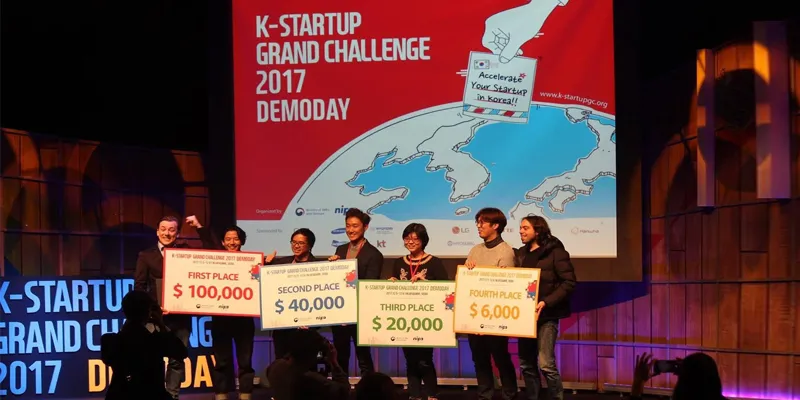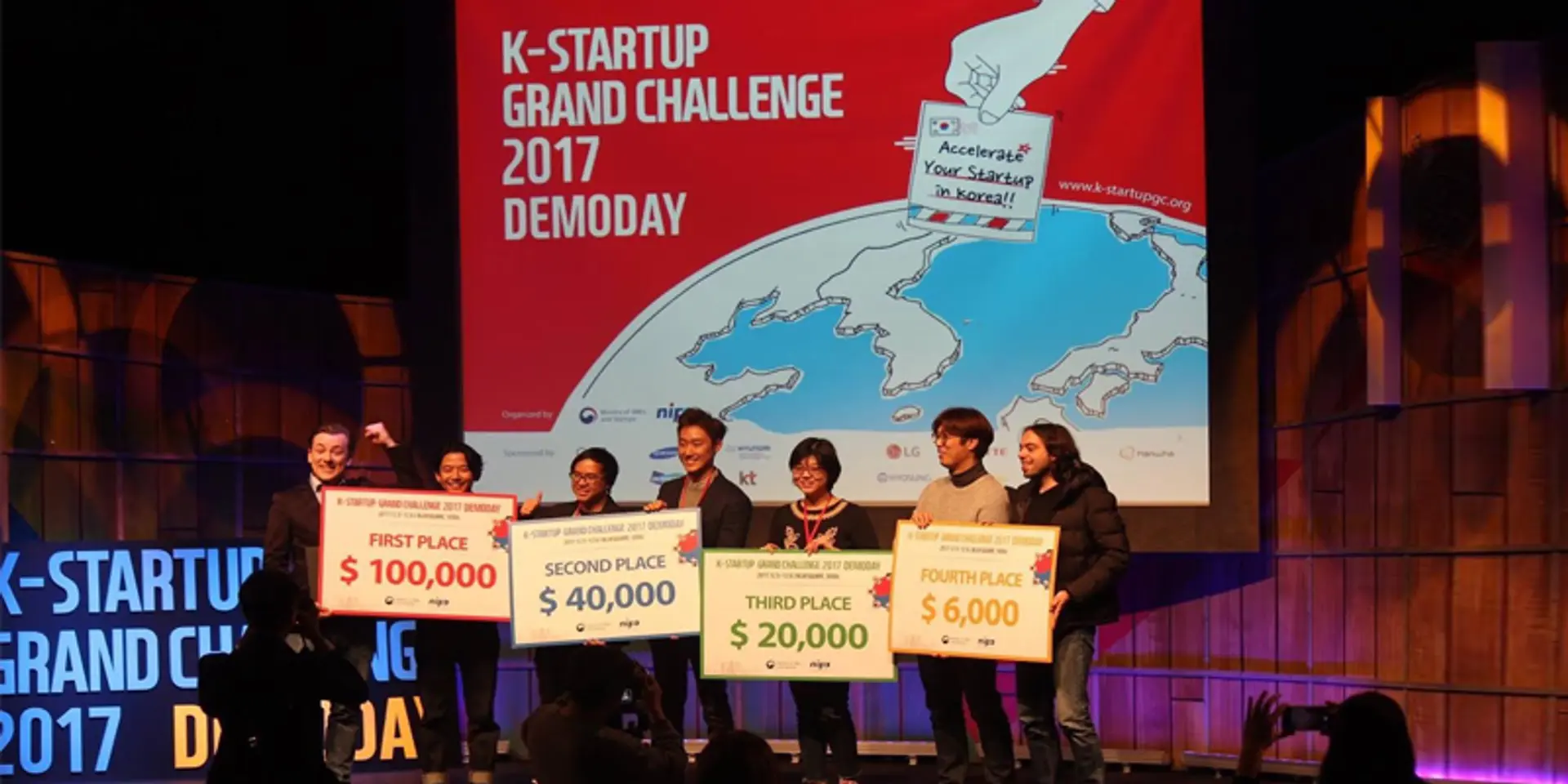
K-Startup
View Brand PublisherFrom smart locks to robots in restaurants, the K-Startup Grand Challenge nurtures disruptive tech ideas
Today, the domestic economies of Asian countries such as India, Japan, and South Korea are experiencing an upsurge, and the region is playing a key role in driving the growth of global economy. In fact, one could even say that the region is a hub for innovative businesses that are pushing the market further up on the growth scale. South Korea, which has been at the forefront of innovation, particularly in the ICT and electronics industry, has a nurturing environment for technology and incubation, and sees a lot of interest from tech startups and entrepreneurs looking to incubate a new idea, improve their tech functions, or expand aggressively in the Asian market.
The South Korean government has taken a proactive approach to support and encourage the startup community, not just home-grown ones but global startups as well. One such initiative is an annual competitive accelerator programme held in Seoul called the K-Startup Grand Challenge, open to startups from all over the world to participate. The programme is organised by the National IT industry Promotion Agency (NIPA), a South Korean government organisation.

In the previous two editions of the programmes, entrepreneurs and startups received funding of over $26 million in total, signed 46 contracts, along with over 300 partnerships and MOUs. In 2017, 1,515 firms from 118 countries competed to be selected at a rigorous acceptance rate of 1.6 percent. The top 25 teams were finally selected to receive comprehensive support, ranging from initial funds, office spaces and visas, to help them successfully settle in the Korean ICT industry.
Two of the 25 winning startups were igloohome and Bear Robotics.
Locking in on a smart solution
Co-founded by Anthony Chow, Kelvin Ho , Sharon Goh, two-year-old igloohome is a Singapore-based smart lock technologies startup, which specialises in creating smart access solutions. It gives property owners the convenience of keyless access and enables them to manage the access to the property remotely. It makes hassles of key handovers, locating forgotten keys, replacing missing ones, or even accidental lock-outs a thing of the past. More importantly, it enables the property owners to give time-sensitive access depending on the need – from hours, to days, even permanently -- thereby keeping the property safe and unwanted guests away. Its flagship products include Smart Mortise Lock, Smart Deadbolt, Smart Keybox and their variants.
The products come with different modes of entry – a PIN code, a Bluetooth key on the smartphone, or a key card, and thereby give more flexibility. The physical key is still available as a back-up. And, because it’s a smart access solution, it is mobile-app enabled, which helps the property owner to manage the access to the property for guests even when he or she is not on location. Any questions about how secure these products are put to rest with the assurance that igloohome products work on innovative technology involving encryption and synchronisation, and users don’t need to be logged on to the internet, hence increasing reliability against WiFi hacking. The igloohome products such as the Smart Mortise Lock, Smart Lock Deadbolt and the Smart Key Box also have an option by which Airbnb hosts can synchronise their listing calendars with their igloohome account so that PIN codes are automatically created for guests.
The smart keybox is an innovative product from igloohome that has been designed for short-term rental hosts, home or property owners. The keys or keycards are stored in the igloohome Smart Keybox and is retrieved with a unique PIN code or Bluetooth key. And, what makes smart key box even more feasible for adoption is ist design – the keybox can be secured on fences, railings, mounted on walls and do not require the doors to be altered. In addition for use-case application in residential homes, service apartments, hostels, the smart key box can also be used for car-sharing, and making it more safer. The Keybox is the upgraded version, which comes with two modes of access and improved resistance to withstand dust and light rain.
Going beyond, just the physical products, igloohome has also partnered with partnered with global insurance company AXA to create AXA-igloohome Protect - a special package for igloohome product owners to assure that the locks and homes will be covered under insurance in case of unexpected situations like theft.
In April 2018, igloohome raised US$4 million in Series A funding led by Insignia Ventures Partners. The funds will be channelized to develop newer smart access solutions for commercial projects, particularly in the hospitality industry in addition to accelerating hiring and investment in R&D. New investors in the Series A round include Phillip Private Equity, X Capital Ventures, Kuok Meng Xiong of K3 Ventures, and angel investor Koh Boon Hwee. Existing investor Wavemaker Partners participated in the round.
With smartphone penetration, advances in mobile computing, telecommunication networks, IoT solutions, focus on smart city infrastructure and home automation, the global smart lock market is on the rise. An industry report states that the global smart locks market will register a promising 18.3% CAGR from 2016 to 2024, rising to a valuation of US$1.01 billion by the end of 2024 from US$226.7 million in 2015. The industry is expected to garner significant growth opportunity, with the adoption of smart lock access devices becoming increasingly mainstream in mature markets, such as the US and Europe, and garnering interest in emerging economies especially in South East Asia.
When robots can help enhance human touch
Bear Robotics, a California based startup started by John Ha, an ex-Googler and restaurateur, is on a mission to revolutionise the restaurant and food service industry using robotics and Artificial Intelligence. The startup founded in 2017 makes robots that help restaurants achieve a three-fold advantage: happy customers through an improved dining experience, happy employees because of greater job satisfaction and happy owners because of better profit margins.
Their flagship robot dubbed Penny is an autonomous food runner that can be programmed to memorise a dining room layout. Using self-driving technology, the robot navigates through the restaurant to bus tables and deliver food to customers. When a particular order is ready, the restaurant managers use a tablet with the Bear Robotics app to call the robot to pick it up. When the customers are done eating, the robot will bring the dirty dishes to the kitchen and then bring the bill to the customers. Penny knows the return guests’ names, purchasing histories and preferences, and helps to create a customised experience for each guest, and thereby drive up value and profit margins. Penny resembles a hip height bowling pin with a flat disc on the top and was first prototyped in the founders’ Korean restaurant in California
Penny has been designed not to replace employees, but to enhance the human-touch and customer experience. In fact, the robot has been programmed to shoulder the physically-intensive parts of service, like dish clearing and delivering heavy plates, so that waiters can actively engage in fulfilling other aspects of their jobs, such as engaging with the customers. Bear Robotics clearly believes that its focus lies in applying AI and robotics to front-end operations, and not back-end operations such as food production.
Unlike other companies that are applying AI to food production with burger-flipping and salad-mixing robots, Bear Robotics is focused solely on the front of house operations. And, as testimony to its focused growth roadmap, Bear Robotics secured funding from South Korean food-tech firm Woowa Brothers, which runs the Baedal Minjok delivery app. The firm invested $2 million in the form of convertible bonds in Bear Robotics' seed round.
K-Start Grand Challenge – 2018 is inviting applications from innovative tech startups
Selected among the top 25 teams at the K-Start Grand Challenge – 2017, igloohome and , got to network with famous global accelerators, businesses, and forge critical partnerships to drive their business ahead. This is addition to a host of benefits, including fund grants, prize money and access to innovation hubs, among others.
This year, you could be the one enjoying this success.
In addition to a chance to win a grant of up to USD 100,000, covered living expenses and assured funding, here is what else awaits you if you are chosen for the K-Start Grand Challenge - 2018:
- A chance to work out of the Global Startup Campus just minutes away from Gangnam – Seoul’s thriving, upscale business district.
- Access to engage in the Pangyo Techno Valley, an innovation hub where SMEs and startups participate in mutual exchange of information with technology research institutes and large global companies.
- Access to Korea’s top tech companies with expertise ranging from smartphones and software to semiconductors and thereby a chance to build strong corporate partnerships.
- Access to VCs and investors who may choose to invest in them. The programme’s accelerators may also make equity investments in the most promising startups.
- Receive funding for an additional 6 months to stay in Korea and officially launch their business.
Know more about the K-Startup Grand Challenge 2018 by registering and applying for the challenge here. Hurry! Applications close June 14.



